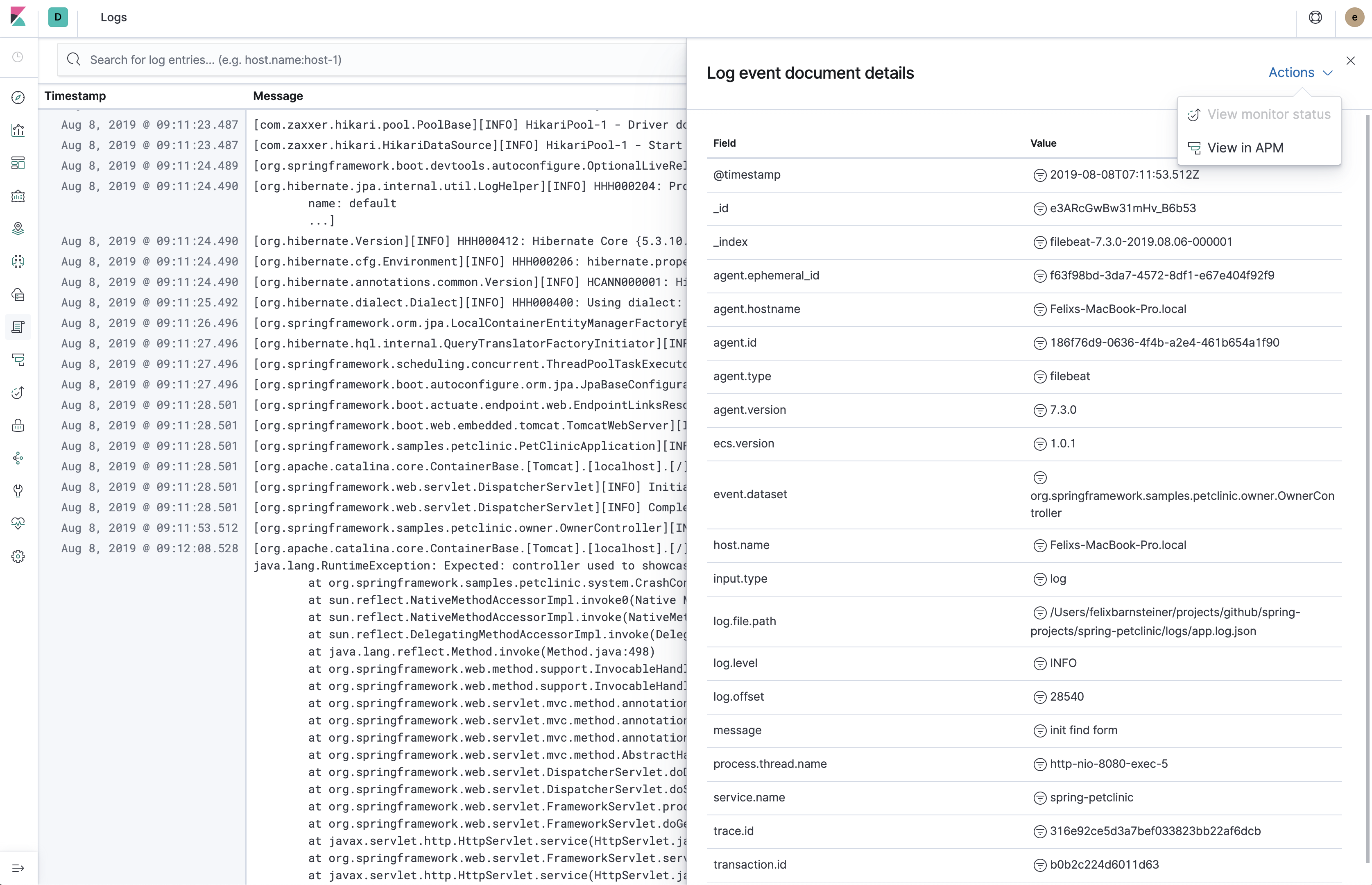Centralized logging for Java applications with the Elastic stack made easy
Please note that this library is in a beta version and backwards-incompatible changes might be introduced in future releases while the major version is zero (0.x.x).
Elastic Common Schema (ECS) defines a common set of fields for ingesting data into Elasticsearch. For more information about ECS, visit the ECS Reference Documentation.
This library helps to log ECS-compatible JSON into a file
Example:
{"@timestamp":"2019-08-06T12:09:12.375Z", "log.level": "INFO", "message":"Tomcat started on port(s): 8080 (http) with context path ''", "service.name":"spring-petclinic","process.thread.name":"restartedMain","log.logger":"org.springframework.boot.web.embedded.tomcat.TomcatWebServer"}
{"@timestamp":"2019-08-06T12:09:12.379Z", "log.level": "INFO", "message":"Started PetClinicApplication in 7.095 seconds (JVM running for 9.082)", "service.name":"spring-petclinic","process.thread.name":"restartedMain","log.logger":"org.springframework.samples.petclinic.PetClinicApplication"}
{"@timestamp":"2019-08-06T14:08:40.199Z", "log.level":"DEBUG", "message":"init find form", "service.name":"spring-petclinic","process.thread.name":"http-nio-8080-exec-8","log.logger":"org.springframework.samples.petclinic.owner.OwnerController","transaction.id":"28b7fb8d5aba51f1","trace.id":"2869b25b5469590610fea49ac04af7da"}
{"@timestamp":"2019-09-17T13:16:48.038Z", "log.level":"ERROR", "message":"Servlet.service() for servlet [dispatcherServlet] in context with path [] threw exception [Request processing failed; nested exception is java.lang.RuntimeException: Expected: controller used to showcase what happens when an exception is thrown] with root cause", "process.thread.name":"http-nio-8080-exec-1","log.logger":"org.apache.catalina.core.ContainerBase.[Tomcat].[localhost].[/].[dispatcherServlet]","log.origin":{"file.name":"DirectJDKLog.java","function":"log","file.line":175},"error.type":"java.lang.RuntimeException","error.message":"Expected: controller used to showcase what happens when an exception is thrown","error.stack_trace":[
"java.lang.RuntimeException: Expected: controller used to showcase what happens when an exception is thrown",
"\tat org.springframework.samples.petclinic.system.CrashController.triggerException(CrashController.java:33)",
"\tat sun.reflect.NativeMethodAccessorImpl.invoke0(Native Method)",
"\tat sun.reflect.NativeMethodAccessorImpl.invoke(NativeMethodAccessorImpl.java:62)",
"\tat sun.reflect.DelegatingMethodAccessorImpl.invoke(DelegatingMethodAccessorImpl.java:43)",
"\tat java.lang.reflect.Method.invoke(Method.java:498)",
"\tat org.apache.tomcat.util.threads.TaskThread$WrappingRunnable.run(TaskThread.java:61)",
"\tat java.lang.Thread.run(Thread.java:748)"]}
- No parsing of the log file required
Logging in ECS-compatible JSON has the advantage that you don't need to set up a logstash/ingest node pipeline to parse logs using grok. - No external dependencies
- Highly efficient by manually serializing JSON
- Low/Zero allocations (reduces GC pauses)
The log4j2EcsLayoutdoes not allocate any memory (unless the log event contains anException) - Decently human-readable JSON structure
The first three fields are always@timestamp,log.levelandmessage. It's also possible to format stack traces so that each element is rendered in a new line. - Use the Kibana Logs UI without additional configuration
As this library adheres to ECS, the Logs UI knows which fields to show - Using a common schema across different services and teams makes it possible create reusable dashboards and avoids mapping explosions.
If you are using the Elastic APM Java agent, you can leverage the log correlation feature without any additional configuration.
This lets you jump from the Span timeline in the APM UI to the Logs UI, showing only the logs which belong to the corresponding request. Vice versa, you can also jump from a log line in the Logs UI to the Span Timeline of the APM UI.
We recommend using this library to log into a JSON log file and let Filebeat send the logs to Elasticsearch
- Resilient in case of outages
Guaranteed at-least-once delivery without buffering within the application, thus no risk ofOutOfMemoryErrors or lost events. There's also the option to use either the JSON logs or plain-text logs as a fallback. - Loose coupling
The application does not need to know the details of the logging backend (URI, credentials, etc.). You can also leverage alternative Filebeat outputs, like Logstash, Kafka or Redis. - Index Lifecycle management
Leverage Filebeat's default index lifemanagement settings. This is much more efficient than using daily indices. - Efficient Elasticsearch mappings
Leverage Filebeat's default ECS-compatible index template
1 It's recommended to use existing ECS fields for MDC values.
If there is no appropriate ECS field,
consider prefixing your fields with labels., as in labels.foo, for simple key/value pairs.
For nested structures consider prefixing with custom. to make sure you won't get conflicts if ECS later adds the same fields but with a different mapping.
- Logback (default for Spring Boot)
- Log4j2
- Log4j
- java.util.logging
- JBoss Log Manager
If you are using the Elastic APM Java agent,
set enable_log_correlation to true.
filebeat.inputs:
- type: log
paths: /path/to/logs.json
json.keys_under_root: true
json.overwrite_keys: true
# no further processing required, logs can directly be sent to Elasticsearch
output.elasticsearch:
hosts: ["https://localhost:9200"]
# Or to Elastic cloud
# Example:
#cloud.id: "staging:dXMtZWFzdC0xLmF3cy5mb3VuZC5pbyRjZWM2ZjI2MWE3NGJmMjRjZTMzYmI4ODExYjg0Mjk0ZiRjNmMyY2E2ZDA0MjI0OWFmMGNjN2Q3YTllOTYyNTc0Mw=="
#cloud.auth: "elastic:YOUR_PASSWORD"
For more information, check the Filebeat documentation
- Enroll the beat
In Kibana, go toManagement>Beats>Central Management>Enroll Beatsand follow the instructions. - Add a
Filebeat inputconfiguration block- Configure the path of the log file(s)
- Set
Other configtype: log json.keys_under_root: true json.overwrite_keys: true
- Add an
Outputconfiguration block- Set
Output typetoElasticsearch - Configure the
hosts - For secured Elasticsearch deployments (like Elastic cloud) set
UsernameandPassword
- Set
Filebeat can normally only decode JSON if there is one JSON object per line.
When stackTraceAsArray is enabled, there will be a new line for each stack trace element which improves readability.
But when combining the multiline settings with a decode_json_fields we can also handle multi-line JSON.
filebeat.inputs:
- type: log
paths: /path/to/logs.json
multiline.pattern: '^{'
multiline.negate: true
multiline.match: after
processors:
- decode_json_fields:
fields: message
target: ""
overwrite_keys: true
# flattens the array to a single string
- script:
when:
has_fields: ['error.stack_trace']
lang: javascript
id: my_filter
source: >
function process(event) {
event.Put("error.stack_trace", event.Get("error.stack_trace").join("\n"));
}
